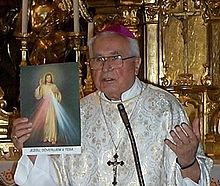Paul Hnilica
Pavel Mária Hnilica SJ , also Pavel Hnilica , German Paul Hnilica , (born March 30, 1921 in Uňatín , Slovakia ; † October 8, 2006 in Nové Hrady ( German : Gratzen )) was bishop of the Roman Catholic Church (Czechoslovak underground bishop ).
Life
Pavel Mária Hnilica came from a poor peasant family, he was the oldest and had seven siblings, attended grammar school and entered the Jesuit order in 1941 and began the novitiate in Kláštor pod Znievom ( German : Kühhorn Monastery). In 1945 he began studying philosophy in the Moravian town of Brno and later in the Bohemian town of Tetschen . He then studied theology in Trnava (Tyrnau) in his Slovak homeland. On September 29, 1950 he was secretly ordained a priest of the Society of Jesus by Bishop Robert Pobožný , Apostolic Administrator of Rožňava (Rosenau) .
On January 2, 1951, he was ordained bishop by Robert Pobožný, without the knowledge of the Holy See. Because of the violent persecution of the church by the communist regime, the consecration of secret underground priests and bishops was intended to prevent the arrest of the officiating and publicly known bishops and priests in order to be able to maintain church life. Since priestly and episcopal ordinations were forbidden in Czechoslovakia at that time , these acts took place underground , in an unknown location. Indeed, shortly afterwards, Bishop Pobožný was placed under house arrest and interned with other bishops in 1953.
Hnilica subsequently consecrated underground priests and on August 4, 1951 also the later Cardinal Ján Chryzostom Korec as bishop.
On December 4, 1951, he fled Czechoslovakia, went to Rome and attended lectures at the Pontifical Gregorian University to deepen his theological studies. He traveled around the world, visited Slovak communities of emigrants in Europe , America and Australia , preached and reported on the events in the communist-ruled homeland.
At the beginning of the Second Vatican Council he was initially an advisor. The meanwhile released Bishop Pobožný, who was allowed to leave the Czechoslovak Socialist Republic (ČSSR) to participate in the council, informed Pope Paul VI in Rome . of the secret consecration of Hnilica as bishop. With the appointment as titular bishop of Rusadus , a submerged diocese in the Roman province of Mauretania Caesariensis in the north of Algeria , on May 13, 1964, Paul VI confirmed. his episcopal ordination and made it publicly known. As a council father, he was allowed to attend the third and fourth sessions.
He worked closely with Chiara Lubich and her Focolare Movement and helped Mother Teresa found her first home in Rome in 1968 and in Slovakia in 1991. In 1968 he founded at the request of Pope Paul VI. the Catholic lay movement Pro fratribus .
As part of the “Embassy of Fatima”, the conversion of Russia was of particular concern to him . On March 24, 1984 ( incognito , as an Italian citizen), with the approval of Pope John Paul II , he celebrated a Holy Mass in the Moscow Kremlin with prayers and texts that the Pope had given him.
In the 1990s he was the rector of the priestly community in the Engelwerk in Rome.
In 1993, as it later emerged, he was falsely convicted by a Milan court of money laundering , which was found in the aftermath of the collapse of Banco Ambrosiano in 1982. In the following years the trial was resumed, during which Hnilica's innocence was proven and he was therefore acquitted in 2000 on all counts.
In the summer of 2006 he left the " Eternal City " and spent the last part of his life in the Mercy Monastery in Nové Hrady (Gratzen) in South Bohemia, where he died on October 8, 2006 at the age of eighty-five. He found his final resting place on October 18, 2006 in the crypt of the Cathedral of St. John the Baptist in his Slovak home diocese of Trnava
Web links
- Entry on Pavel Mária Hnilica on catholic-hierarchy.org
- HE Mons. Paul Maria Hnilica SJ on the pages of the KBS - Slovak Bishops' Conference (Slovak)
- THE TESTIMONY OF BISHOP HNILICA - Fatima, Russia & Pope John Paul II (English)
- Medjugorje - An Interview with Bishop Hnilica (English)
- Paul Hnilica in the database of Find a Grave (English)
- Bishop Pavol M. Hnilica, “Church in Need” and the German Bishops - Lecture by church historian Prof. Rudolf Grulich at an international conference on the Slovak bishop Pavol Hnilica (Bratislava, March 29, 2019)
Individual evidence
- ↑ Entry on Pavel Mária Hnilica on catholic-hierarchy.org ; accessed on February 20, 2018.
- ↑ Revue des Ordinations Épiscopales , 1951 edition, No. 1
- ^ Le Petit Episcopologe , Edition 187, Nekrolog
- ^ Slovak Radio - biography
- ↑ Heiner Boberski : The angel work. Theory and Practice of Opus Angelorum. Otto Müller Verlag, Salzburg 1993, ISBN 3-7013-0854-3 , p. 88
- ↑ Biography Hnilica
- ^ History of the monastery in Gratzen (Nové Hrady) | Klášter Božího Milosrdenství. Retrieved July 17, 2020 .
- ↑ Data Hnilica website
| personal data | |
|---|---|
| SURNAME | Hnilica, Paul |
| ALTERNATIVE NAMES | Hnilica, Pavel Mária |
| BRIEF DESCRIPTION | Slovak underground Roman Catholic bishop |
| DATE OF BIRTH | March 30, 1921 |
| PLACE OF BIRTH | Uňatín , Slovakia |
| DATE OF DEATH | October 8, 2006 |
| Place of death | Nové Hrady Czech Republic , South Bohemia |
